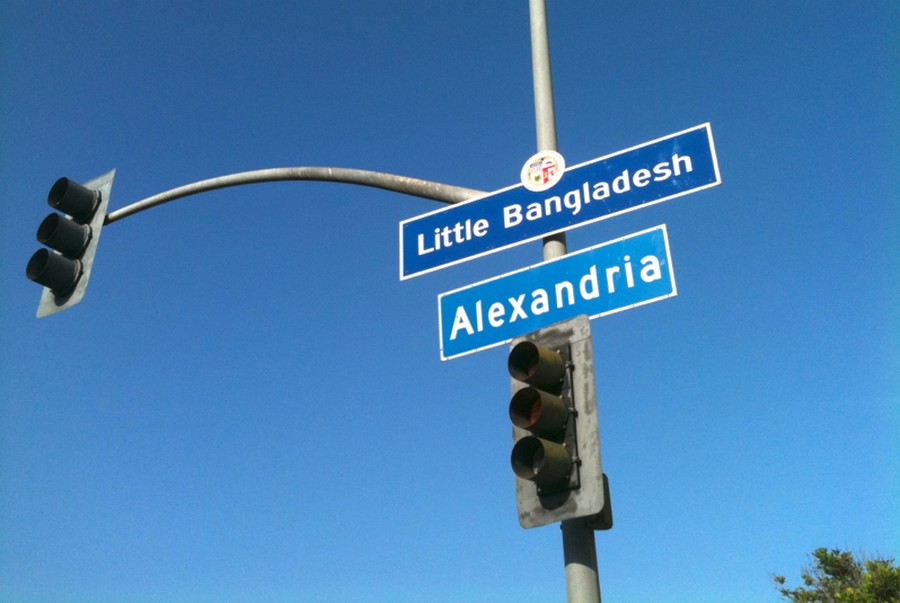Little Bangladesh is one of L.A.'s smallest neighborhoods, tucked away just north of Koreatown. Its few, unassuming blocks provide an apt metaphor for the abundant land of Bangladesh itself; a tiny country sitting in the shadow of one of the most prominent in the world.
It’s been 13 years since Little Bangladesh was recognized by the City of Los Angeles as an official neighborhood. I recently took a walk through its streets to get a feel for the neighborhood and its food.
If I didn’t know better, I wouldn’t have immediately perceived that I was in a dedicated Bengali neighborhood. Unlike, say, Koreatown or Little Ethiopia, where your surroundings make such things obvious, primarily due to the abundance of restaurants specializing in the recipes of the countries they represent.
Bengali restaurants aren’t as dominant as one may imagine here. I saw nearly as many Chinese, Mexican, and Thai restaurants on its blocks. Even within Little Bangladesh, Bengali representation felt relatively lacking.
That feeling changed once I stepped inside some of these restaurants.
There is a particular love ingrained in their food that you can feel, and certainly taste, among all of the rich flavors and delicate meats. It is also apparent how crucial these markets are for the livelihoods of Bengali immigrants in L.A.
Bangladesh was split off from India during the partition of 1947, which Great Britain helped foment, resulting in the deaths of millions of Indians. Bangladesh was dubbed “East Pakistan” (despite being on the opposite side of India from “West” Pakistan); the reasoning being that both areas had Muslim majorities and thus, must share a “nation.” Pakistan proceeded to rule East Pakistan with an iron fist until the independence movement overthrew the military rule in 1971, and Bangladesh gained independence.
Naturally, there are shared spices, ingredients, recipes, and influences leading to many similarities with Indian cuisine.
One noticeable difference: Bengali cuisine tends to be meatier, while following Halal standards, because over 90% of Bangladeshis are Sunni Muslim and Islam is the official state religion, despite it being a secular nation.
The cooking is distinct in its own right but still under-the-radar of many Angelenos. With so many of us viewing Bengali food as an enigma, the restaurant owners, aware of this problem, are working to introduce their cuisine to wider groups of people in a welcoming way.
Here are two restaurants I've come to appreciate in L.A.'s Little Bangladesh to get you out of your comfort zone and get started eating delicious Bengali food.
Aladin Sweets & Market
Aladin Sweets & Market is the pioneer, the first restaurant and market, of Little Bangladesh. Johnny Islam and his family have owned the establishment since the early 90’s, when his parents emigrated from Bangladesh to L.A.
At the time, there was no established Bengali community in L.A., but the number of Bangladeshis immigrating here was growing, with nowhere to buy the food that they were accustomed to.
“Food is a big habit of ours, where we just can't change and have American burgers on a daily basis,” Islam tells me.
His parents noticed this growing demand and started importing goods directly from Bangladesh to open the market, which has turned into a community hub where the neighbors gather.
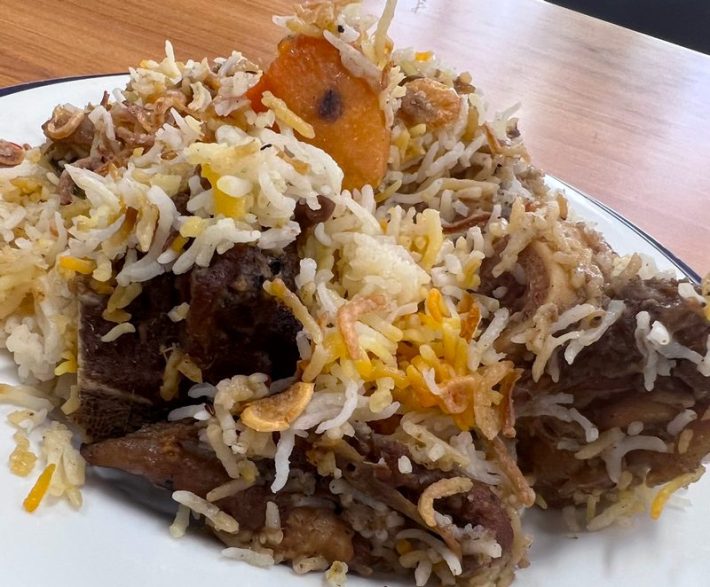
Johnny says Bangladeshis don’t eat biryani on a daily basis, but rather, reserve it for a special occasion. It's easy to see why when tasting his lamb biryani, which is unlike any I’ve ever had, with 5 large chunks still on the bone hiding amid a mountain of rich rice. You scrape the meat off and it melts right into that rice.
Islam instructs guests to eat the lamb, rice, and the sweet potato topping the peak of the rice mountain all together. The fresh and indulgent recipe is made with rose water, lots of saffron, and something detectably sweet. This is aloo bukhara, dried plum, sporadically surprising you in the midst of eating the dish. It’s also sprinkled with fried onion, which adds a slight crunch and greater texture.
Aladin's chicken roast in a savory gravy is more sweet than spicy, and very satisfying, with light, juicy dark meat. On the side was a small patty called a shami kabob filled with ground chicken and daal (lentils) fried in bread crumbs. This was the spiciest thing I ate here, although tolerable. It’s served alongside a green, chile-cilantro yogurt dip that brightens everything up.
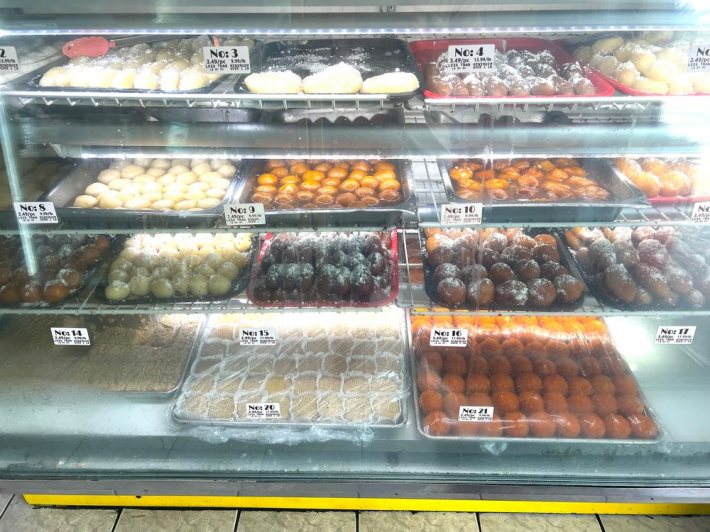
When you walk into Aladin, you’re greeted by a whole showcase of "gulla," sweet little balls brought as gifts when going to someone’s home.
“That's our tradition,” Johnny says.
Some are baked, some are fried, and some are lathered in syrup. I tried one called "kachagulla," made of cottage cheese, sugar, milk powder, and “secret ingredients.” It taste like a little ball of dough with subtle sweetness and a slightly grainy consistency.
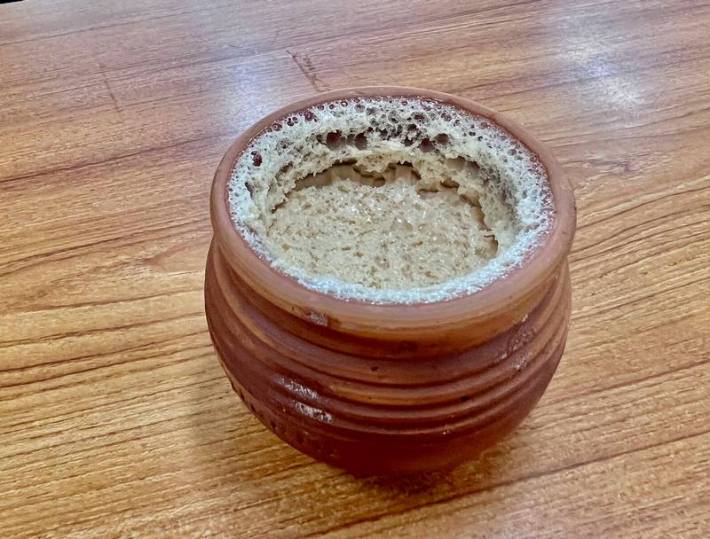
Finally, the sweet, yogurty treat mishti doi, presented in a cold, handmade, Bangladeshi clay pot, hit the table after bubbly milk was poured onto its custardy yogurt base, forming a spongy-looking top layer. It’s essentially a rich, silky-smooth, flan-like custard made of milk and sugar. I couldn’t stop eating it.
139 S. Vermont Ave. Los Angeles, CA 90004. Closest Metro lines and stop: Bus Line 204 - “Vermont/1st”, Metro B Line and Bus Lines 14 or 754 - "Vermont/Beverly Station."
Biriyani Kabob House
Biriyani Kabob House is a small establishment with some seriously incredible food that presents itself as a Bangladeshi, Indian, and Pakistani restaurant. I arrived around lunchtime to meet Enamul Karim, the owner. The place was packed.
Karim came to America to go to school and work, eventually becoming an aeronautical engineer. He opened up Biryani Kabob House 10 years ago after an injury prevented him from continuing that career after 25 years.
“I always had a passion for food," he tells L.A. TACO. "I always liked food, I always cooked food. My wife said, 'just open up a little restaurant.'"
But it wasn’t for the money. Karim has enough to pay his bills and get by.
“Cooking to me is not a job," he says. "I love to serve food… cooking is my religion… cooking is art.”
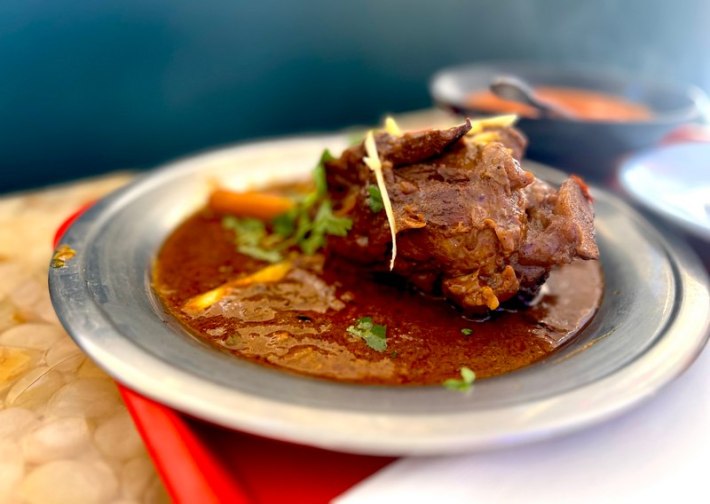
And his food tastes like art. Karim is eager for guests to try his specialty: the lamb shank. There is no need to use a knife to cut a hunk of meat off of this gigantic bone, it falls right off. But its strengths don't lie in tenderness alone. There's a savory sweetness to the curry it sits in that melds with the meat, making for a remarkable, memorable, even special dish.
Other South Asian dishes are served here, including chicken tikka masala, the most popular order here, Karim tells me, likely because of the familiarity factor (it’s an Indian-style dish whose popularity, and perhaps very invention, is credited to Britain, not Bangladesh).
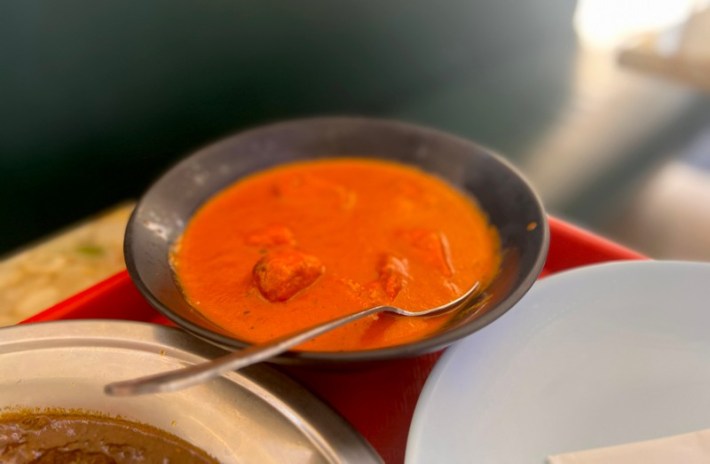
While the chicken in too many local tikka masalas can dependably be a bit rubbery, it’s cooked to prime tenderness here. With a rich, sweet masala that should launch you into this new dimension I now exist in once you've followed my lead and dipped your garlic naan into it.
As for the lamb biryani here, it is a bit more plain, though still with that stand-out flavor and a kick of spice that complements the rest of the sweet-and-savory meal. Karim tells me this heat is one of many things that aligns Southern Indian food closer to that of Bangladesh's, as opposed to the recipes of other regions of India, like its northern states.
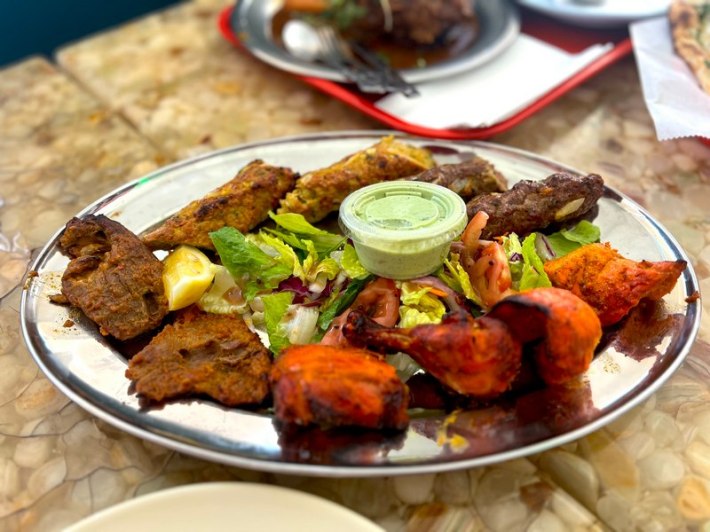
Another specialty here is the kabob sampling platter, which is overwhelming in the best way possible, starting with both boneless and boned cuts of smoky red tandoori chicken, the tri-tip beef bihari kabab, and tender, juicy ground beef and chicken seekh kababs. The platter is served with raita, the side serving of cooling yogurt ubiquitous to Indian dining, this one with cilantro, mint, jalapeno, and the unusual addition of tamarind.
Karim is very proud of his diverse customer base. He is on a mission to make Bengali food more popular in L.A.
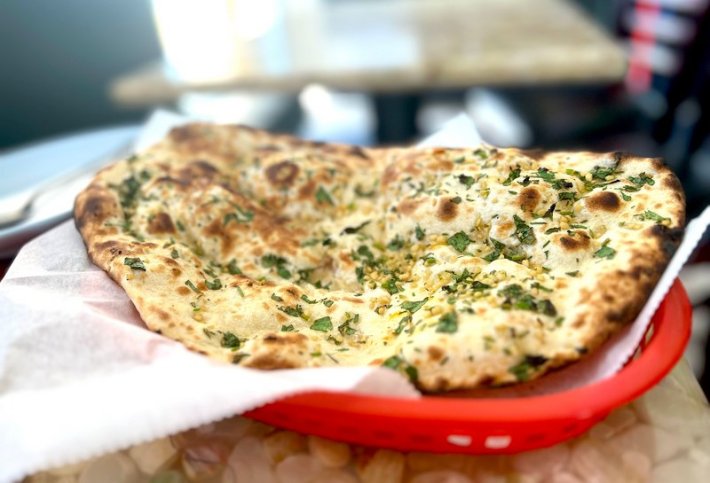
In addition to the Little Bangladesh location, he has a second restaurant of the same name in Downtown L.A. And he’s getting ready to introduce his food to more people in the city, currently planning to open up in Westwood, Northridge, and Culver City in a more “fast-casual” setting.
He’ll treat college students at these locations with a complete $10 meal to help them get by while they’re studying and perhaps piling on debt. It’s his way of paying it forward to the city that has provided him so much.
Biriyani Kabob House, 3525 W. 3rd St. Los Angeles, CA 90020. Closest Metro lines and stop: Bus Lines 16, 204 or 754 - “Vermont/3rd.”
This is just a dip of the toe into L.A.'s Little Bangladesh. We encourage Angelenos to beeline to the Koreatown-area neighborhood to walk its blocks and explore its eateries.
The only thing left to do now... is eat!
